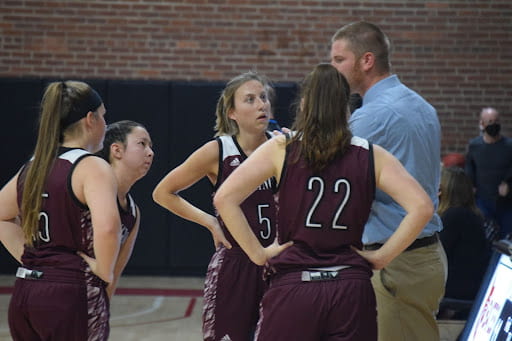
Dec 16, 2021 | Exclusive, Feature, News, Sports, TopStory |
By Page Brown, contributing writer
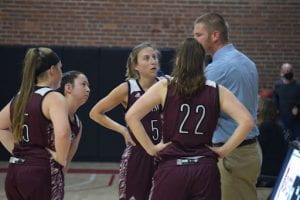
Nathan Carson speaks to his players during a free throw against Bates College on Nov. 16. Courtesy of Jacqui Hamilton.
UMF’s women’s basketball team is off to a strong start under the guidance of newly hired interim basketball head coach Nathan Carson. The squad, who is sitting at 5-2, saw key wins including winning the Castleton Invitational Tip-Off Tournament and the UMF Tip-Off Tournament in their opening two weekends of play.
Carson came into the program familiar with the players and program as he served as an assistant coach for the men’s program since the 2014-2015 season. Carson himself is a UMF graduate, graduating in 2014 with a degree in community health and playing for legendary UMF coach Dick Meader. While playing for the Beavers, Carson saw immense success, starting for three years and scoring 536 points, while maintaining a 77.6% free throw percentage and 36.5% three-point field goal shooting percentage. During his senior season, the team reached the North Atlantic Conference Men’s Basketball Championship.
The new coach hopes to bring his success to the team as the squad looks for a deep tournament run.
“The team is off to a strong start, we have had some gritty wins in the first half of our season. We love to get out and run and have fun, and I know that when we do that, we can be a dangerous team in NAC play.”
The desire to reach the playoffs comes to no surprise as the team returns 13 players, including all five starters from the 2019-2020 season that saw the team reach the championship game. The veteran led group is headed by a large senior class, thanks in part to the pandemic granting two players an additional year of eligibility within the National Collegiate Athletic Association.
Since the 2019-2020 season, the team has lost only four players: 2020 graduate Sara Lamb, 2021 graduates Halee Ramsdell, Kasey Talerico, and Chelsea Crockett. UMF forward McKenna Brodeur, a two-time first team all-star, looks to lead this year’s squad to a North Atlantic Conference Championship. She is joined by senior guard Alex Bessey, a second-team all star, and senior guards Makayla Wilson, Tia Day and senior forward Page Brown. Other key returning players for the Beavers this year include senior guard/forward Molly Folsom, junior guard Courtney Brent, and senior forward Cassidy Delano.
Yet the experienced group is also joined by a group of new players and coaches. Six players, Emily Small, Maddie Forgues, Kiely Renyolds, Jalyn Stacy, Jaycie Stevens, and Grace Woodman join the team. The group looks to make an immediate impact on the team, highlighting the talent on this years’ squad.
The squad was able to compete in only two scrimmages in the 2020-2021 season. However the 2019-2020 year saw the team going 14-14, culminating into a huge 70-63 win against conference foe Maine Maritime Academy in the NAC semi-final before falling to five time champion Husson University 70-60.
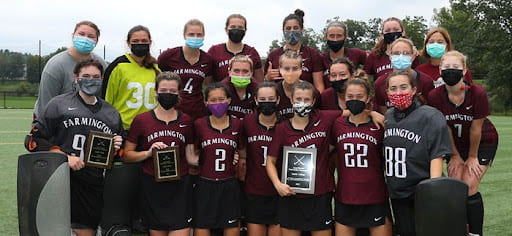
Oct 10, 2021 | News, Sports, TopStory |
By Page Brown, Contributing Writer.
After a year of canceled competition due to COVID-19, all six UMF fall varsity teams are well underway with an active season. The Beavers have seen immense success, with teams placing in several events and tournaments alongside individual athletes receiving numerous accolades.
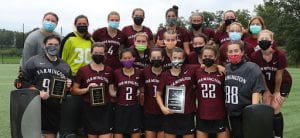
The field hockey team experienced a tremendous kickoff to their season, winning the Caryl Newhof Classic tournament at Smith College in Northampton, Massachusetts. The team defeated Westfield State 6-1, with senior Alex Bessey knocking in a career-high of 4 goals, and Smith College 3-2 in the final game. Alex Bessey and Grace DiMarco both took home the top New England Collegiate Conference awards, with Bessey claiming Offensive Player of the Week and DiMarco hailed Goalkeeper of the Week for the opening week of play. Since then, the team has posted a 3-3 record, including 1-1 in conference play.
The men’s soccer team has also exhibited a strong start to the season, posting a 5-1 record in the opening few weeks of the Fall 2021 campaign. The team faced early obstacles of game cancellations due to COVID and weather, however senior captain goalkeeper Jonah Sautter said these obstacles have only brought the team closer. “We’ve continued to look forward and focus on what we can control,” Sautter said. “We are all connecting on and off the field.” In their season opener, the Beavers performed strong, winning 5-1. The victory was the first opening game victory since 2017. Yusuf Mohamed scored two goals, with Sautter tallying a career-high of nine saves. The accomplishment awarded Sautter with the North Atlantic Conference Men’s Soccer Defensive Player of the Week for the conference’s first week of play.
The following game was against NAC rival Husson University, where a late rally saw the Beavers fall short 2-1 with Jimmy Pelletier scoring the sole goal. Since the loss, the Beavers have won five consecutive games including victories against Castleton University, Northern-Vermont University-Johnson, the University of Maine at Presque Isle, SUNY Cobleskill, and SUNY Delhi. The Beavers saw narrow victories against Castleton University, Johnson, and SUNY Cobleskill, with the pair of 2-1 victories being attributed to the overall grittiness of the team. The 5-1 victory against UMPI saw the Beavers take 28 shots on goal, with Gracien Mukwa netting two goals. The strong start creates an optimistic look into the postseason. Senior Captain Silas Mohler highlighted this excitement, yet remained focused on the upcoming games. “The conference is full of talented teams hungry to win, it should be a fun postseason,” Mohler said. “We have a great group of guys and I’m excited for what’s to come.”
The women’s soccer team has posted a 1-5 record in their opening games. The squad now heads into conference play, having faced University of Maine at Presque Isle, SUNY College of Environmental Science and Forestry and SUNY Delhi. The team has gone 1-2 against NAC opponents. The team’s conference victory came with a 1-0 win over the University of Maine at Presque Isle. Morgan Thompsom logged the lone goal for the day, while Farmington held a 28-10 advantage in total shots, alongside six corner kicks to UMPI’s one.
The cross country teams have participated in three invitational tournaments at Colby-Sawyer College, Thomas College and Husson University. The group is young, with 13 of the 22 runners being first-years. Head coach Sean Caniss noted their effect, saying they have “made a big impact” on the competitiveness and culture of the team.
On the women’s side, the Beavers took fourth place at the Colby-Sawyer Invitational, with Anna MacDonald finishing in 16th place with a time of 23:37.43. The Beavers scored 96 points, finishing behind Colby-Sawyer with 29 points, Plymouth State with 52 points, and St. Joseph’s College of Maine with 62 points.
The women had a strong finish at Thomas, clinching second place with 48 points, with Husson University winning the event with 37 points. MacDonald finished in seventh, with a time of 27:04.78. Emily Eaton finished just behind MacDonald, crossing the finish line in eighth place with a time of 27:10.18.
At Husson, the women finished in third place with 66 points. Charlotte Wentworth finished tenth, with a time of 23:05.6. Colby College won the Husson Harrier event with 38 points, followed by Husson University with 47.
The men’s cross country team ended in second place at the Colby-Sawyer Charger Invitational. The Beavers saw three runners finish in the top seven. Justin Castaldo was the first finisher for the Beavers, placing fourth with a time of 17:01.10. The Beavers scored 40 points, with Plymouth State winning the meet with 34 points.
At Thomas College, the Beavers finished in third place with 74 points, behind the University of Southern Maine with 33 points, and Husson with 63 points. Justin Castaldo finished the race with a time of 31:03.57, securing 10th place. Teammates Covy Dufort and Jimmy Reel finished in 13th and 14th place, with times of 31:31.10 and 31:50.53, respectively.
The Beavers won the Husson Harrier Invitational, with five scoring runners in the top 13. Justin Castaldo was the first Beaver to cross the finish line, coming in sixth place with a time of 29:20.5, with teammate Covy Dufort crossing at 29:25.3, earning him seventh place. UMF scored 49 points to lead the event, with Husson finishing in second with 53 points, followed by Colby College with 63 points, Maine Maritime with 66 points, and Thomas College with 103 points.
The UMF Golf Team has participated in five matches so far. In a dual match against Thomas, UMF lost 340 to 325. Neil Larochelle III scored a 78 on the par 70 Waterville course, while teammates Kellen True and Ryan Sargent both scored 86. The team placed fourth at the Thomas College Invitational, with Larochelle III scoring a 70 on the same Waterville course. Chris Frey scored an 81, which earned him an 11th place tie. At the UMF Invitational, the Beavers placed sixth with a total of 337 points. Larochelle III finished with 79, while teammates Daniel Mickiewicz completed with a score of 85 and Jack Burton scored an 86. At the University of Southern Maine Cup, the Beavers placed third with a score of 231. The golfers played in pairs, with Mickiewicz/True tying for third with 73, Larochelle/Sargent finishing with 74, and Burton/Frey earning 10th with an 84. At the Bowdoin Invitational, the team ended in 15th place. Sargent scored an 83, while True and Larochelle both scored an 85.
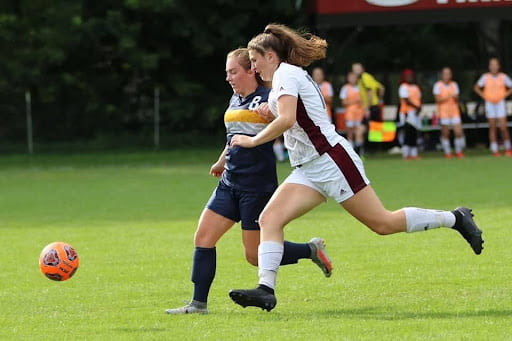
Sep 27, 2021 | Feature, Sports, TopStory |
By Page Brown, Contributing Writer
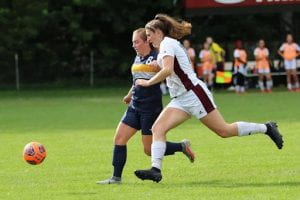
UMF Senior Mckenna Brodeur chases down a ball during a soccer game against the University of Southern Maine.
University of Maine at Farmington student-athletes have returned to the field this year after a full season of Covid-related adjustments. A lack of competition and team interactions coupled with regular testing and mask-wearing took a toll on the mental health of many athletes, who traditionally pride themselves on strength and perseverance. Pushing through a tough practice or game is championed by advertisers, coaches, parents, and society as a whole. Yet, in the post-pandemic world- this narrative has shifted as student-athletes dismantle the warrior mentality and open up about mental health struggles.
The pandemic placed athletes in a vulnerable state, removed from their traditional routine. Researchers at the National Collegiate Athletic Association found that the rates of reported mental health concerns in the fall of 2020 were 1.5 to two times higher than in previous studies.
The increase in reported struggles comes as no surprise to UMF Interim Athletic Director Jamie Beaudoin. “For fifteen years they have had this routine, and COVID has interrupted their routine,” Beaudoin said. “And even though we were able to find ways for teams to practice and compete, it wasn’t what it used to be. This added to student-athletes anxiety as it isn’t what they are used to.”
UMF men’s soccer head coach Blake Hart said he’s seen noticeable shifts in team wellbeing, with players appearing unwilling to practice, nerves surrounding COVID, and poor team chemistry. “As a coach, it was hard to try and lead a team, but more so to watch players not enjoying a pivotal piece in their everyday life,” Hart said.
These struggles were also noticed by women’s soccer player McKenna Brodeur and men’s golf team member Christopher Frey, both pointing towards the lack of team interaction and loss of athletics creating sentiments of anxiety and isolation. Both athletes believe there has been an influx of mental health concerns, and that raising awareness of it and being a supportive outlet for their teammates both mentally and physically is now prioritized. “We all know how fortunate we are to play and we’re enjoying each day together,” Brodeur said.
These comments point to a shift in athletics, with coaches and players alike recognizing the importance of keeping healthy both mentally and physically in order to perform at their full potential. The change in dialogue has been encouraged at UMF. During DIII week last April, UMF athletes attended yoga classes and informational workshops about the importance of resilience and stress management. Guest speakers such as Victoria Garrick, founder of The Hidden Opponent, visited UMF last spring and spoke against the perceived weakness around mental health. Garrick discussed how the lack of visibility paints a misleading portrait on the mental well-being of athletes, an aspect she reiterated in an interview with the New York Times. “I remember Googling and not being able to find anyone or athletes who made me feel less alone.”
Her organization creates the place she was searching for through advocacy programs that argue that being mentally tough is no longer hiding behind a facade of strength, rather it lies in checking in on teammates, speaking up when one is struggling, and advocating for others to do the same. Mental health resources are becoming more readily available and accessible for athletes, granting students a space to grapple with the widespread mental health crisis.
Yet, this is just the beginning of this cultural shift, with Beaudoin using a metaphor to describe the crossing point athletics is at, stating “COVID showed us a bit more of the iceberg. As a coach, I see the tip of the iceberg, but COVID lowered the water and made it so mental health is much more open and out in front of others.” Continuing to hold these conversations and creating spaces for athletes to discuss their mental health changes the paradigm from mental weakness back to strength.





